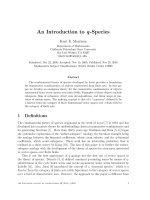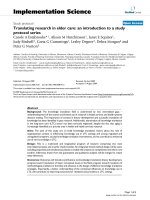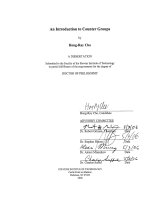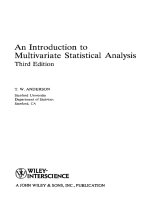AN INTRODUCTION TO OCAML
Bạn đang xem bản rút gọn của tài liệu. Xem và tải ngay bản đầy đủ của tài liệu tại đây (333.74 KB, 76 trang )
<span class="text_page_counter">Trang 1</span><div class="page_container" data-page="1">
An Introduction to OCamlStephen A. Edwards
Columbia University
Fall 2018
</div><span class="text_page_counter">Trang 2</span><div class="page_container" data-page="2">The BasicsFunctions
Tuples, Lists, and Pattern MatchingUser-Defined Types
Modules and Compilation
A Complete Interpreter in Three SlidesExceptions; Directed Graphs
Standard Library Modules
</div><span class="text_page_counter">Trang 3</span><div class="page_container" data-page="3">An Endorsement?
A PLT student accurately summed up using OCaml:
<i>Never have I spentso much timewriting so littlethat does so much.</i>
I think he was complaining, but I’m not sure.Other students have said things like
<i>It’s hard to get it to compile, but once it compiles, itworks.</i>
</div><span class="text_page_counter">Trang 4</span><div class="page_container" data-page="4">Why OCaml?
Ï
It’s Great for Compilers
I’ve written compilers in C++, Python, Java, and OCaml,and it’s much easier in OCaml.
Ï
It’s Succinct
Would you prefer to write 10 000 lines of code or 5 000?
Ï
Its Type System Catches Many Bugs
It catches missing cases, data structure misuse, certainoff-by-one errors, etc. Automatic garbage collectionand lack of null pointers makes it safer than Java.
</div><span class="text_page_counter">Trang 5</span><div class="page_container" data-page="5">OCaml in One Slide
<i>Apply a function to each list element; save results in a list</i>
#letrec“Is recursive”
rec mapf
Passing a function
f = function[] -> []
|head :: tail
head :: tail ->
let rLocal name
head inr::
(function x -> x + 3) [1;5;9];;
- :int list = [4; 8; 12]
</div><span class="text_page_counter">Trang 6</span><div class="page_container" data-page="6">The Basics
</div><span class="text_page_counter">Trang 7</span><div class="page_container" data-page="7">Hello World in OCaml: Interpret or CompileCreate a “hello.ml” file:
<i>print_endline "Hello World!"</i>
Run it with the interpreter:
$ ocaml hello.ml
Hello World!
Compile a native executable and run:
$ ocamlopt -o hello hello.ml
</div><span class="text_page_counter">Trang 8</span><div class="page_container" data-page="8">Hello World in OCaml: REPLThe interactive Read-Eval-Print Loop
$ ocaml
OCaml version 4.02.3# print_endline "Hello World!";;
Hello World!- : unit = ()# #use "hello.ml";;
Hello World!- : unit = ()# #quit;;
</div><span class="text_page_counter">Trang 9</span><div class="page_container" data-page="9">(* This is a multilinecomment in OCaml *)(* Comments
(* like these *)do nest
/* do notnest*/
// C++/Java also has// single-line comments
</div><span class="text_page_counter">Trang 10</span><div class="page_container" data-page="10">Basic Types and Expressions
# 42 + 17;;
- : int = 59# 42.0 +. 18.3;;
- : float = 60.3# 42 + 60.3;;
Error: This expression has typefloat but an expression wasexpected of type int# 42 + int_of_float 60.3;;
- : unit = ()
# print_endline "Hello World!";;
Hello World!- : unit = ()
Floating-point numbersFloating-point operatorsmust be explicit (e.g.,
Only explicit
conversions, promotions(e.g.,int_of_float)Booleans
The unit type is like“void” in C and Java
</div><span class="text_page_counter">Trang 11</span><div class="page_container" data-page="11">Standard Operators and Functions
+ - * / modInteger arithmetic
+.-.<sub>*.</sub>/.<sub>**</sub>Floating-point arithmetic
ceil floor sqrt exp
log log10 cos sinFloating-point functions
tan acos asin atan
not && ||Boolean operators
= <>Structual comparison (polymorphic)
== !=Physical comparison (polymorphic)
< > <= >=Comparisons (polymorphic)
</div><span class="text_page_counter">Trang 12</span><div class="page_container" data-page="12">Structural vs. Physical Equality
==,!=Physical equalitycompares pointers
# 1 == 3;;
- : bool = false# 1 == 1;;
- : bool = true# 1.5 == 1.5;;
- : bool = false (* Huh? *)
# let f = 1.5 in f == f;;
- : bool = true# "a" == "a";;
- : bool = false (* Huh? *)
# let a = "hello" in a == a;;
- : bool = true
=,<>Structural equalitycompares values
# 1 = 3;;
- : bool = false# 1 = 1;;
- : bool = true# 1.5 = 1.5;;
- : bool = true
# let f = 1.5 in f = f;;
- : bool = true# "a" = "a";;
- : bool = true
Use structural equality to avoid headaches
</div><span class="text_page_counter">Trang 13</span><div class="page_container" data-page="13"><b>if</b><i>expr</i>
1<b>then</b><i>expr</i>
2<b>else</b><i>expr</i>
3<i>If-then-else in OCaml is an expression. The else part iscompulsory, expr</i>
<sub>1</sub><i>must be Boolean, and the types of expr</i>
<sub>2</sub><i>and expr</i>
3must match.
# if 3 = 4 then 42 else 17;;
- : int = 17
# if "a" = "a" then 42 else 17;;
- : int = 42
# if true then 42 else "17";;
This expression has type string but is here used with type int
</div><span class="text_page_counter">Trang 14</span><div class="page_container" data-page="14"><i>Naming Expressions with let</i>
<b>let</b><i>name</i><b>=</b><i>expr</i>
1<b>in</b><i>expr</i>
2<i>Bind name to expr</i>
1<i>in expr</i>
2only
# let x = 38 in x + 4;;
- : int = 42
# let x = (let y = 2 in y + y) * 10 in x;;
- : int = 40# x + 4;;
Unbound value x# let x = 38;;
val x : int = 38# x + 4;;
</div><span class="text_page_counter">Trang 15</span><div class="page_container" data-page="15"><i>Let is Not Assignment</i>
<i>Let can be used to bind a succession of values to a name.</i>
This is not assignment: the value disappears in the end.
# let a = 4 inlet a = a + 2 inlet a = a * 2 ina;;
- : int = 12# a;;
Unbound value a
This looks like sequencing, but it is really data dependence.
</div><span class="text_page_counter">Trang 16</span><div class="page_container" data-page="16"><i>Let is Really Not Assignment</i>
OCaml picks up the values in effect where the function (orexpression) is defined.
Global declarations are not like C’s global variables.
# let a = 5;;
val a : int = 5# let adda x = x + a;;
val adda : int -> int = <fun># let a = 10;;
val a : int = 10# adda 0;;
- : int = 5 (* adda sees a = 5 *)# let adda x = x + a;;
val adda : int -> int = <fun># adda 0;;
- : int = 10 (* adda sees a = 10 *)
</div><span class="text_page_counter">Trang 17</span><div class="page_container" data-page="17">Functions
</div><span class="text_page_counter">Trang 18</span><div class="page_container" data-page="18">A function is just another type whose value can be definedwith an expression.
# fun x -> x * x;;
- : int -> int = <fun>
# (fun x -> x * x) 5;; (* function application *)
- : int = 25
# fun x -> (fun y -> x * y);;
- : int -> int -> int = <fun>
# fun x y -> x * y;; (* shorthand *)
- : int -> int -> int = <fun>
# (fun x -> (fun y -> (x+1) * y)) 3 5;;
- : int = 20
# let square = fun x -> x * x;;
val square : int -> int = <fun># square 5;;
- : int = 25
# let square x = x * x;; (* shorthand *)
val square : int -> int = <fun># square 6;;
- : int = 36
</div><span class="text_page_counter">Trang 19</span><div class="page_container" data-page="19"><i>Let is Like Function Application</i>
<b>let</b><i>name</i><b>=</b><i>expr</i>
1<b>in</b><i>expr</i>
2<i>Both mean “expr</i>
2<i>, with name replaced by expr</i>
1”
</div><span class="text_page_counter">Trang 20</span><div class="page_container" data-page="20">Recursive FunctionsOCaml
<i>let rec allows for recursion</i>
Use recursion instead of loops
Tail recursion runs efficiently in OCaml
</div><span class="text_page_counter">Trang 21</span><div class="page_container" data-page="21">Recursive Functions
By default, a name is not visible in its defining expression.
# let fac n = if n < 2 then 1 else n * fac (n-1);;
Unbound value fac
<i>The rec keyword makes the name visible.</i>
# let rec fac n = if n < 2 then 1 else n * fac (n-1);;
val fac : int -> int = <fun># fac 5;;
- : int = 120
<i>The and keyword allows for mutual recursion.</i>
# let rec fac n = if n < 2 then 1 else n * fac1 nand fac1 n = fac (n - 1);;
val fac : int -> int = <fun>val fac1 : int -> int = <fun># fac 5;;
- : int = 120
</div><span class="text_page_counter">Trang 22</span><div class="page_container" data-page="22">First-Class and Higher Order Functions
First-class functions: name them, pass them as arguments
# let appadd = fun f -> (f 42) + 17;;
val appadd : (int -> int) -> int = <fun># let plus5 x = x + 5;;
val plus5 : int -> int = <fun># appadd plus5;;
- : int = 64
Higher-order functions: functions that return functions
# let makeInc i = fun x -> x + i;;
val makeInc : int -> int -> int = <fun># let i5 = makeInc 5;;
val i5 : int -> int = <fun># i5 10;;
- : int = 15
</div><span class="text_page_counter">Trang 23</span><div class="page_container" data-page="23">Tuples, Lists, and PatternMatching
</div><span class="text_page_counter">Trang 24</span><div class="page_container" data-page="24">Pairs or tuples of different types separated by commas.Very useful lightweight data type, e.g., for functionarguments.
- : string = "Arthur"
# let trip = ("Douglas", 42, "Adams");;
val trip : string * int * string = ("Douglas", 42, "Adams")# let (fname, _, lname) = trip in (lname, fname);;
- : string * string = ("Adams", "Douglas")
</div><span class="text_page_counter">Trang 25</span><div class="page_container" data-page="25">[1; 2] :: [3; 4];; (* BAD: type error *)
(* concat: Append a list to the end of another *)
<i>[1; 2] @ [3; 4];;</i> (* Gives [1; 2; 3; 4] *)(* Extract first entry and remainder of a list *)
<i>List.hd [42; 17; 28];;</i> (* = 42 *)
<i>List.tl [42; 17; 28];;</i> (* = [17; 28] *)
The elements of a list must all be the same type.
::is very fast;@is slower—<i>O(n)</i>
<i>Pattern: create a list with cons, then use List.rev.</i>
</div><span class="text_page_counter">Trang 26</span><div class="page_container" data-page="26">Some Useful List FunctionsThree great replacements for loops:
Ï
List.map f [a1; ... ;an] = [f a1; ... ;f an]
Apply a function to each element of a list to produceanother list.
Ï
List.fold_left f a [b1; ...;bn] =f (...(f (f a b1) b2)...) bn
Apply a function to a partial result and an element ofthe list to produce the next partial result.
Ï
List.iter f [a1; ...;an] =begin f a1; ... ; f an; () end
Apply a function to each element of a list; produce aunit result.
Ï
List.rev [a1; ...; an] = [an; ... ;a1]
Reverse the order of the elements of a list.
</div><span class="text_page_counter">Trang 27</span><div class="page_container" data-page="27">List Functions Illustrated
- : unit = ()
# List.iter print_endline (List.map string_of_int [42; 17; 128]);;
- : unit = ()
</div><span class="text_page_counter">Trang 28</span><div class="page_container" data-page="28">Example: Enumerating List Elements
To transform a list and pass information between elements,
<i>use List.fold_left with a tuple:</i>
# let (l, _) = List.fold_left
(fun (l, n) e -> ((e, n)::l, n+1)) ([], 0) [42; 17; 128]in List.rev l;;
- : (int * int) list = [(42, 0); (17, 1); (128, 2)]
<i>Result accumulated in the (l, n) tuple, List.rev reverses the</i>
result (built backwards) in the end. Can do the same with a
<i>recursive function, but List.fold_left separates list traversal</i>
</div><span class="text_page_counter">Trang 29</span><div class="page_container" data-page="29">Pattern Matching
A powerful variety of multi-way branch that is adept atpicking apart data structures. Unlike anything in C/C++/Java.
# let xor p = match p
with (false, false) -> false| (false, true) -> true| ( true, false) -> true| ( true, true) -> false;;
val xor : bool * bool -> bool = <fun># xor (true, true);;
- : bool = false
A name in a pattern matches anything and is bound whenthe pattern matches. Each may appear only once perpattern.
# let xor p = match pwith (false, x) -> x
| ( true, x) -> not x;;
val xor : bool * bool -> bool = <fun># xor (true, true);;
- : bool = false
</div><span class="text_page_counter">Trang 30</span><div class="page_container" data-page="30">val xor : bool * bool -> bool = <fun># let xor p = match p
with (false, x) -> x| (true, x) -> not x| (false, false) -> false;;
Warning U: this match case is unused.val xor : bool * bool -> bool = <fun>
</div><span class="text_page_counter">Trang 31</span><div class="page_container" data-page="31">Underscore (_) is a wildcard that will match anything, usefulas a default or when you just don’t care.
# let xor p = match p
with (true, false) | (false, true) -> true| _ -> false;;
val xor : bool * bool -> bool = <fun># xor (true, true);;
- : bool = false# xor (false, false);;
- : bool = false# xor (true, false);;
- : bool = true
</div><span class="text_page_counter">Trang 32</span><div class="page_container" data-page="32">Pattern Matching with Lists
# let length = function (* let length = fun p -> match p with *)[] -> "empty"
| [_] -> "singleton"| [_; _] -> "pair"| [_; _; _] -> "triplet"| hd :: tl -> "many";;
val length : ’a list -> string = <fun># length [];;
- : string = "empty"# length [1; 2];;
- : string = "pair"
# length ["foo"; "bar"; "baz"];;
- : string = "triplet"# length [1; 2; 3; 4];;
- : string = "many"
</div><span class="text_page_counter">Trang 33</span><div class="page_container" data-page="33"><i>Pattern Matching with when and as</i>
<i>The when keyword lets you add a guard expression:</i>
# let tall = function
| (h, s) when h > 180 -> s ^ " is tall"| (_, s) -> s ^ " is short";;
val tall : int * string -> string = <fun>
# List.map tall [(183, "Stephen"); (150, "Nina")];;
- : string list = ["Stephen is tall"; "Nina is short"]
<i>The as keyword lets you name parts of a matched structure:</i>
# match ((3,9), 4) with(_ as xx, 4) -> xx| _ -> (0,0);;
- : int * int = (3, 9)
</div><span class="text_page_counter">Trang 34</span><div class="page_container" data-page="34">Application: Length of a list
<b>let rec</b> <i>length l =</i>
<b>if</b> <i><b>l = [] then 0 else 1 + length (List.tl l);;</b></i>
Correct, but not very elegant. With pattern matching,
<b>let rec</b> <i><b>length = function</b></i>
[] -> 0
<i>| _::tl -> 1 + length tl;;</i>
Elegant, but inefficient because it is not tail-recursive (needs
<i>O(n)</i>stack space). Common trick: use an argument as anaccumulator.
</div><span class="text_page_counter">Trang 35</span><div class="page_container" data-page="35">OCaml Can Compile This EfficientlyOCaml source code
<b>let</b> <i>length list =</i>
<b>let rec</b> <i><b>helper len = function</b></i>
Ï
Tail recursion
implemented with jumps
Ï
LSB of an integeralways 1
ocamlopt generates this x86assembly
cmpl $1, %ebx # empty?
je .L100
movl 4(%ebx), %ebx # get tail
addl $2, %eax # len++
jmp .L101.L100:
camlLength__length:movl %eax, %ebx
movl $camlLength__2, %eaxmovl $1, %eax # len = 0
jmp camlLength__helper
</div><span class="text_page_counter">Trang 36</span><div class="page_container" data-page="36">User-Defined Types
</div><span class="text_page_counter">Trang 37</span><div class="page_container" data-page="37">Type Declarations
<i>A new type name is defined globally. Unlike let, type is</i>
recursive by default, so the name being defined may appear
<i>in the typedef.</i>
<i>Mutually-recursive types can be defined with and.</i>
<b>type</b><i>name</i>
1<b>=</b><i>typedef</i>
1<b>and</b><i>name</i>
2<b>=</b><i>typedef</i>
2<b>and</b><i>name</i>
<i>n</i><b>=</b><i>typedef</i>
<i>n</i></div><span class="text_page_counter">Trang 38</span><div class="page_container" data-page="38"><i>OCaml supports records much like C’s structs.</i>
# type base = { x : int; y : int; name : string };;
type base = { x : int; y : int; name : string; }# let b0 = { x = 0; y = 0; name = "home" };;
val b0 : base = {x = 0; y = 0; name = "home"}# let b1 = { b0 with x = 90; name = "first" };;
val b1 : base = {x = 90; y = 0; name = "first"}# let b2 = { b1 with y = 90; name = "second" };;
val b2 : base = {x = 90; y = 90; name = "second"}# b0.name;;
- : string = "home"# let dist b1 b2 =
let hyp x y = sqrt (float_of_int (x*x + y*y)) inhyp (b1.x - b2.x) (b1.y - b2.y);;
val dist : base -> base -> float = <fun># dist b0 b1;;
- : float = 90.# dist b0 b2;;
- : float = 127.279220613578559
</div><span class="text_page_counter">Trang 39</span><div class="page_container" data-page="39">Algebraic Types/Tagged Unions/Sum-Product Types
<i>Vaguely like C’s unions, enums, or a class hierarchy: objects</i>
that can be one of a set of types. In compilers, great fortrees and instructions.
# type seasons = Winter | Spring | Summer | Fall;;
type seasons = Winter | Spring | Summer | Fall# let weather = function
Winter -> "Too Cold"| Spring -> "Too Wet"| Summer -> "Too Hot"| Fall -> "Too Short";;
val weather : seasons -> string = <fun># weather Spring;;
- : string = "Too Wet"
# let year = [Winter; Spring; Summer; Fall] inList.map weather year;;
- : string list = ["Too Cold"; "Too Wet"; "Too Hot"; "Too Short"]
</div><span class="text_page_counter">Trang 40</span><div class="page_container" data-page="40">Simple Syntax Trees and an Interpreter
# type expr =Lit of int
| Plus of expr * expr| Minus of expr * expr| Times of expr * expr;;
type expr =Lit of int
| Plus of expr * expr| Minus of expr * expr| Times of expr * expr# let rec eval = function
Lit(x) -> x
| Plus(e1, e2) -> (eval e1) + (eval e2)| Minus(e1, e2) -> (eval e1) - (eval e2)| Times(e1, e2) -> (eval e1) * (eval e2);;
val eval : expr -> int = <fun># eval (Lit(42));;
</div><span class="text_page_counter">Trang 41</span><div class="page_container" data-page="41">Algebraic Type Rules
Each tag name must begin with a capital letter
# let bad1 = left | right;;
Syntax error
Tag names must be globally unique (required for typeinference)
# type weekend = Sat | Sun;;
type weekend = Sat | Sun# type days = Sun | Mon | Tue;;
type days = Sun | Mon | Tue
# function Sat -> "sat" | Sun -> "sun";;
This pattern matches values of type days
but is here used to match values of type weekend
</div><span class="text_page_counter">Trang 42</span><div class="page_container" data-page="42">Algebraic Types and Pattern MatchingThe compiler warns about missing cases:
# type expr =Lit of int
| Plus of expr * expr| Minus of expr * expr| Times of expr * expr;;
type expr =Lit of int
| Plus of expr * expr| Minus of expr * expr| Times of expr * expr# let rec eval = function
val eval : expr -> int = <fun>
</div><span class="text_page_counter">Trang 43</span><div class="page_container" data-page="43"><i>The Option Type: A Safe Null Pointer</i>
Part of the always-loaded core library:
type ’a option = None | Some of ’a
This is a polymorphic algebraic type:’a<i>is any type. None islike a null pointer; Some is a non-null pointer. The compilerrequires None to be handled explicitly.</i>
# let rec sum = function
</div><span class="text_page_counter">Trang 44</span><div class="page_container" data-page="44">Algebraic Types vs. Classes and Enums
<b>Algebraic TypesClassesEnumsChoice of Types</b>fixedextensiblefixed
<b>Case splitting</b>simplecostlysimpleAn algebraic type is best when the set of types rarelychange but you often want to add additional functions.Classes are good in exactly the opposite case.
</div><span class="text_page_counter">Trang 45</span><div class="page_container" data-page="45">Modules and Compilation
</div><span class="text_page_counter">Trang 46</span><div class="page_container" data-page="46">Each source file is a module and everything is public.foo.ml
(* Module Foo *)
<b>type</b> <i>t = { x : int ; y : int }</i>
<b>let</b> <i>sum c = c.x + c.y</i>
To compile and run these,
(* Create a short name *)
<b>module</b> <i>F = Foo;;print_int (F.sum v)</i>
(* Import every name froma module with "open" *)
<b>open</b> <i>Foo;;print_int (sum v)</i>
</div><span class="text_page_counter">Trang 47</span><div class="page_container" data-page="47">Separating Interface and Implementationstack.mli
<b>type</b> <i>’a t</i>
<b>exception</b> <i>Empty</i>
<b>val</b> <i>create : unit -> ’a t</i>
<b>val</b> <i>push : ’a -> ’a t -> unit</i>
<b>val</b> <i>pop : ’a t -> ’a</i>
<b>val</b> <i>top : ’a t -> ’a</i>
<b>val</b> <i>clear : ’a t -> unit</i>
<b>val</b> <i>copy : ’a t -> ’a t</i>
<b>val</b> <i>is_empty : ’a t -> bool</i>
<b>val</b> <i>length : ’a t -> int</i>
<b>val</b> <i>iter : (’a -> unit) ->’a t -> unit</i>
<b>let</b> <i>length s = List.length s.c</i>
<b>let</b> <i>iter f s = List.iter f s.c</i>
</div>








